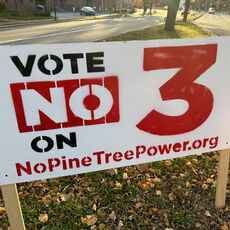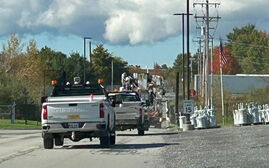
Takeover of CMP, Versant overwhelmingly rejected by Maine voters on Tuesday
 Photo / William Hall
On Tuesday, voters flocked to the Freeport polls and others throughout Maine to cast ballots in eight statewide referendums.
Photo / William Hall
On Tuesday, voters flocked to the Freeport polls and others throughout Maine to cast ballots in eight statewide referendums.
Leaders of Maine's two investor-owned electricity utilities, Central Maine Power and Versant Power, breathed a sigh of relief Tuesday when voters soundly rejected a referendum that would have replaced their companies with one belonging to the state.
With nearly all ballots counted Wednesday morning, 69% of them — 264,991 of more than 382,000 cast — said "no" to Question 3. Supporters tallied 117,028 votes for the proposal, which called for Maine to buy out both electricity distribution companies and in their stead create a nonprofit utility, Pine Tree Power.
Mainers also doubled down in their opposition to Pine Tree Power by approving another referendum that asked if voter approval should be required before the state or a public utility incurs $1 billion or more in debt. That measure, Question 1, passed with 65% of the votes cast. It effectively prevents Maine from borrowing the funds needed to acquire CMP and Versant.
The votes were among eight referendums on the statewide ballot. Also among them, Question 4 asked if Maine should require motor vehicle manufacturers to standardize on-board diagnostics and make access to vehicle systems available to owners and independent repair shops. The "right the repair" measure was approved by 84% of voters.
But the dueling questions over the creation of a public utility — both of which resulted from citizen initiatives — drew the most heated attention. Both votes followed contentious campaigns and a years-long, often bitter public feud over the performance of Maine's two major power companies.
Overseen by a publicly elected board, Pine Tree Power would have delivered lower-cost, more reliable electricity, backers of the Question 3 proposal claimed.
That assertion was disputed by opponents including CMP, Versant and a coalition of businesses and consumers. They also pointed out that Maine might have to borrow as much as $13.5 billion to pay for the assets of the utilities.

Responding to the election outcome, CMP spokesman Jonathan Breed issued a statement saying, "With this referendum behind us, we are turning the page. As we look forward, we must continue to modernize our grid to support Maine’s climate change goals, connect new renewable resources, and electrify our communities."
At Versant, President John Flynn said in a statement, "With the campaign now behind us, we are eager to build consensus and momentum for meeting Maine’s energy and climate goals and delivering the best possible service and value for our customers."
Willy Ritch, executive director of the Maine Affordable Energy Coalition, said, “Maine voters did their homework, they did their research and, by an overwhelming majority, rejected Pine Tree Power ... It was a hard-fought campaign but now it’s over and it’s time for all of us to come together as Mainers to take on the challenges our state faces.”
Attempts to reach Our Power, the group behind the Question 3 proposal, were not immediately successful.
In recent years, both CMP and Versant have been publicly criticized over rate increases, some of which have been dictated by changes in the costs of generating electricity and so are not in the control of the two companies, which transmit and distribute power.
CMP has also been criticized over a series of billing errors several years ago. Both CMP and Versant have ranked among the country's electric utilities with the worst customer satisfaction, according to market research firm J.D. Power.












0 Comments